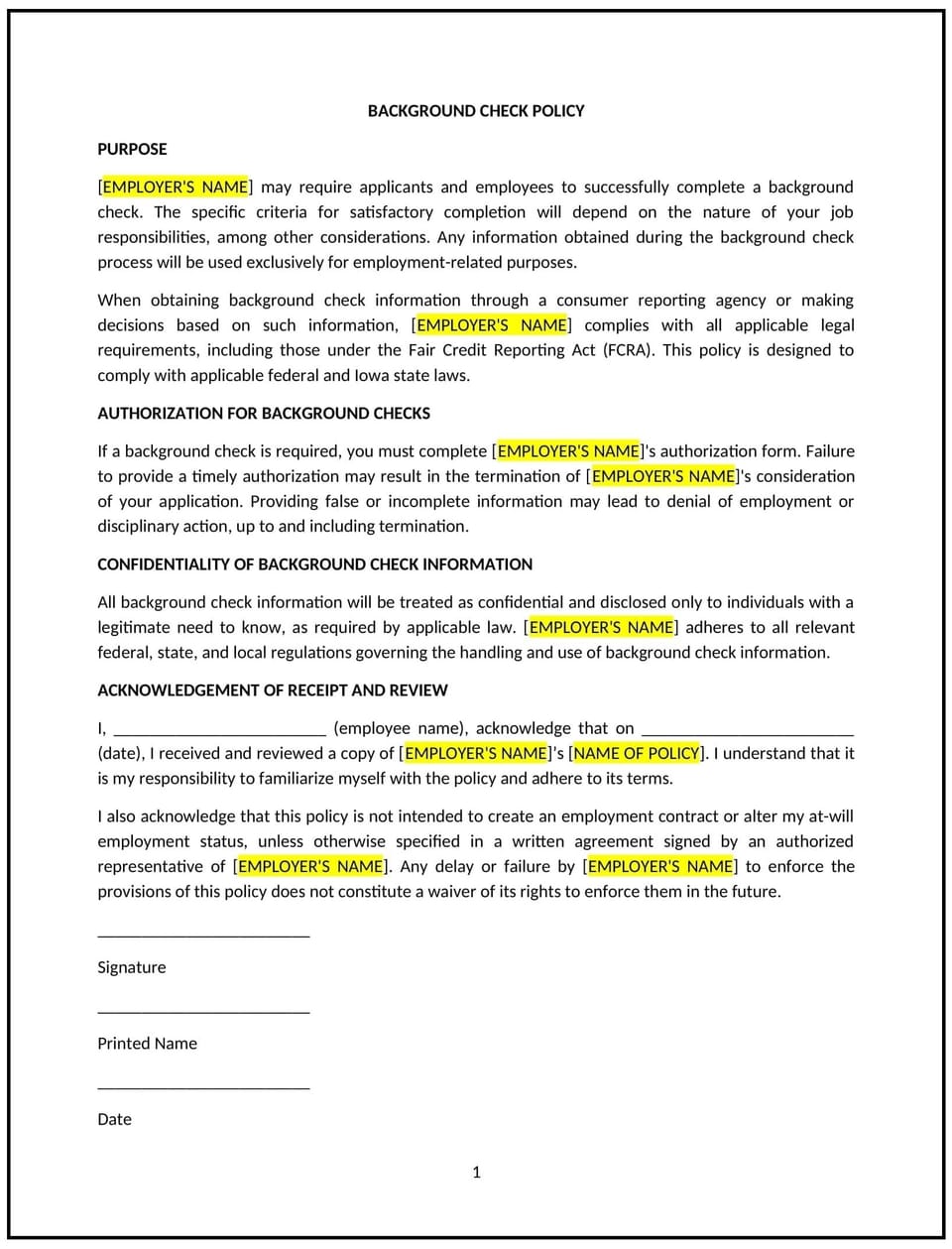Background check policy (Iowa): Free template

Background check policy (Iowa)
A background check policy helps Iowa businesses establish clear guidelines for conducting pre-employment screenings, ensuring that hiring decisions are based on verified information. Background checks may include reviewing criminal history, employment records, education credentials, and professional licenses.
This policy provides businesses with a structured process for conducting background checks while complying with federal and Iowa-specific regulations. It also outlines applicant rights and responsibilities to promote fair hiring practices.
By implementing this policy, businesses in Iowa can make informed hiring decisions, mitigate risks, and protect workplace integrity.
How to use this background check policy (Iowa)
- Define screening requirements: Specify which positions require background checks and the types of screenings conducted.
- Obtain candidate consent: Ensure applicants provide written authorization before conducting any background checks.
- Outline screening procedures: Describe how background checks will be conducted, including third-party screening services or internal review processes.
- Address criminal history considerations: Establish criteria for evaluating past convictions based on job-relatedness and business needs.
- Ensure confidentiality: Maintain strict confidentiality of background check results and limit access to authorized personnel.
- Provide adverse action procedures: Establish a process for notifying candidates of adverse hiring decisions based on background check results.
- Monitor compliance requirements: Stay informed about Iowa and federal regulations governing background checks in hiring decisions.
- Review and update: Regularly assess and update the policy to align with business needs and legal changes.
Benefits of using this background check policy (Iowa)
This policy offers several advantages for Iowa businesses:
- Supports informed hiring decisions: Helps businesses verify applicant credentials and assess potential risks.
- Protects workplace integrity: Reduces the likelihood of fraud, misrepresentation, or unqualified hires.
- Promotes fair hiring practices: Establishes consistent screening criteria for all job applicants.
- Reduces liability risks: Helps businesses identify potential concerns before hiring.
- Enhances workplace security: Ensures employees meet job-related background requirements.
- Encourages transparency: Communicates hiring expectations clearly to job candidates.
Tips for using this background check policy (Iowa)
- Communicate screening requirements: Businesses should inform applicants of background check expectations early in the hiring process.
- Obtain proper authorization: Businesses should secure written consent before conducting any background screenings.
- Use a consistent screening process: Businesses should apply uniform screening criteria to all candidates to promote fairness.
- Evaluate findings objectively: Businesses should assess background check results based on job relevance rather than automatic disqualification.
- Maintain confidentiality: Businesses should restrict access to background check information to authorized personnel only.
- Provide clear rejection procedures: Businesses should follow proper notification steps when background check results impact hiring decisions.
Q: Why should Iowa businesses conduct background checks?
A: Businesses should conduct background checks to verify applicant credentials, assess potential risks, and maintain workplace security.
Q: What types of background checks can businesses perform?
A: Businesses should consider screening for criminal history, employment verification, education credentials, professional licenses, and financial history for relevant positions.
Q: How should businesses obtain candidate consent for background checks?
A: Businesses should require candidates to sign a written authorization form before conducting any screenings.
Q: Can businesses deny employment based on a criminal record?
A: Businesses should evaluate convictions based on job relevance, the nature of the offense, and any applicable Iowa hiring regulations.
Q: How should businesses handle adverse hiring decisions?
A: Businesses should provide candidates with a written notice explaining the decision, include a copy of the background check report, and allow an opportunity to respond.
Q: How often should businesses review their background check policy?
A: Businesses should review the policy annually or as laws and hiring practices evolve.
Q: Can small businesses in Iowa benefit from background checks?
A: Yes, businesses of all sizes should consider background checks to verify applicant information and reduce hiring risks.
Q: How should businesses ensure confidentiality in background checks?
A: Businesses should store records securely, limit access to authorized personnel, and dispose of background check reports properly when no longer needed.
This article contains general legal information and does not contain legal advice. Cobrief is not a law firm or a substitute for an attorney or law firm. The law is complex and changes often. For legal advice, please ask a lawyer.


